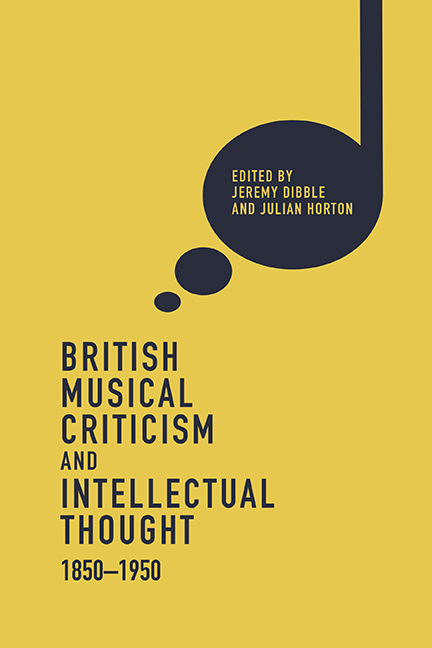Book contents
- Frontmatter
- Dedication
- Contents
- List of Illustrations
- List of Contributors
- Acknowledgements
- Introduction: Trends in British Musical Thought, 1850–1950
- 1 Avoiding ‘Coarse Invective’ and ‘Unseemly Vehemence’: English Music Criticism, 1850–1870
- 2 Spencer, Sympathy and the Oxford School of Music Criticism
- 3 Free Thought and the Musician: Ernest Walker, the ‘English Hanslick’
- 4 Ernest Newman and the Promise of Method in Biography, Criticism and History
- 5 ‘Making Symphony Articulate’: Bernard Shaw's Sense of Music History
- 6 Analysis and Value Judgement: Schumann, Bruckner and Tovey's Essays in Musical Analysis
- 7 The Scholar as Critic: Edward J. Dent
- 8 Russia and Eastern Europe
- 9 Anti-Intellectualism and the Rhetoric of ‘National Character’ in Music: The Vulgarity of Over-Refinement
- 10 Chosen Causes: Writings on Music by Bernard van Dieren, Peter Warlock and Cecil Gray
- 11 ‘Es klang so alt und war doch so neu’: Vaughan Williams, Aesthetics and History
- 12 Constant Lambert: A Critic for Today? A Commentary on Music Ho!
- 13 The Challenge to Goodwill: Herbert Howells, Alban Berg and ‘The Modern Problem’
- 14 Hans Keller: The Making of an ‘Anti-Critic’
- Select Bibliography
- Index
- Titles listed here were originally published
13 - The Challenge to Goodwill: Herbert Howells, Alban Berg and ‘The Modern Problem’
Published online by Cambridge University Press: 17 July 2019
- Frontmatter
- Dedication
- Contents
- List of Illustrations
- List of Contributors
- Acknowledgements
- Introduction: Trends in British Musical Thought, 1850–1950
- 1 Avoiding ‘Coarse Invective’ and ‘Unseemly Vehemence’: English Music Criticism, 1850–1870
- 2 Spencer, Sympathy and the Oxford School of Music Criticism
- 3 Free Thought and the Musician: Ernest Walker, the ‘English Hanslick’
- 4 Ernest Newman and the Promise of Method in Biography, Criticism and History
- 5 ‘Making Symphony Articulate’: Bernard Shaw's Sense of Music History
- 6 Analysis and Value Judgement: Schumann, Bruckner and Tovey's Essays in Musical Analysis
- 7 The Scholar as Critic: Edward J. Dent
- 8 Russia and Eastern Europe
- 9 Anti-Intellectualism and the Rhetoric of ‘National Character’ in Music: The Vulgarity of Over-Refinement
- 10 Chosen Causes: Writings on Music by Bernard van Dieren, Peter Warlock and Cecil Gray
- 11 ‘Es klang so alt und war doch so neu’: Vaughan Williams, Aesthetics and History
- 12 Constant Lambert: A Critic for Today? A Commentary on Music Ho!
- 13 The Challenge to Goodwill: Herbert Howells, Alban Berg and ‘The Modern Problem’
- 14 Hans Keller: The Making of an ‘Anti-Critic’
- Select Bibliography
- Index
- Titles listed here were originally published
Summary
THE field of English literature benefits greatly from the role of the writer- critic, or more specifically here, the poet-critic. In one sense a ‘British’ modernism has no place in that field, headed up as it was by foreign figures such as T. S. Eliot and Ezra Pound. Both T. S. Eliot's critical writings and his celebrated poetry create a symbiotic relationship of meaning; it is almost impossible to imagine one without the other. To take one example of Eliot the critic, his 1919 essay ‘Tradition and the Individual Talent’ has a central role in the field of literary criticism and sets out his early views on how a poet must develop his/her ‘historical sense’ in order to write with a truly dynamic view of past, present and future; but, of course, Eliot is always speaking as a practitioner, his methodology is primarily empirical. This synergy is most clearly expressed in the opening of Four Quartets, where the roles of poet and critic combine into an artistic philosophy: ‘Time present and time past / Are both perhaps present in time future, / And time future contained in time past’. Frequently, contemporary writers on modernism emphasize a break with the past (especially the immediate past), when it is equally important to critique how those connections between past, present and future are made and remade.
This chapter examines the technical and aesthetic considerations informing Herbert Howells's views on musical modernism as instantiated by his lectures for the BBC, understood in relation to ongoing debates about British musical modernism and the current prevalence of inter-disciplinary modes of thought. If one considers that the first generation of the ‘English Musical Renaissance’ was dominated by Parry and Stanford at the Royal College of Music, then Howells, as one of Parry's star pupils and Stanford's self-confessed ‘son in music’, was the likely chief inheritor of that tradition, spending the rest of his life teaching at the RCM. One of Stanford's earlier students (and subsequent Director of the Royal College of Music), Sir George Dyson, will also be considered within this second generation, as an influence on Howells, particularly through his book The New Music.
- Type
- Chapter
- Information
- British Musical Criticism and Intellectual Thought, 1850–1950 , pp. 304 - 327Publisher: Boydell & BrewerPrint publication year: 2018

